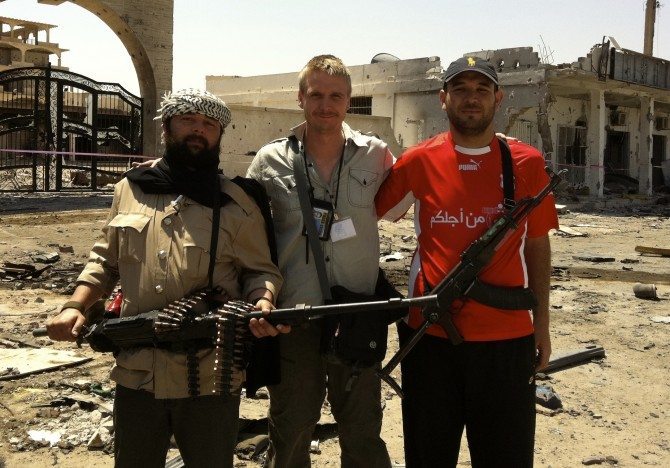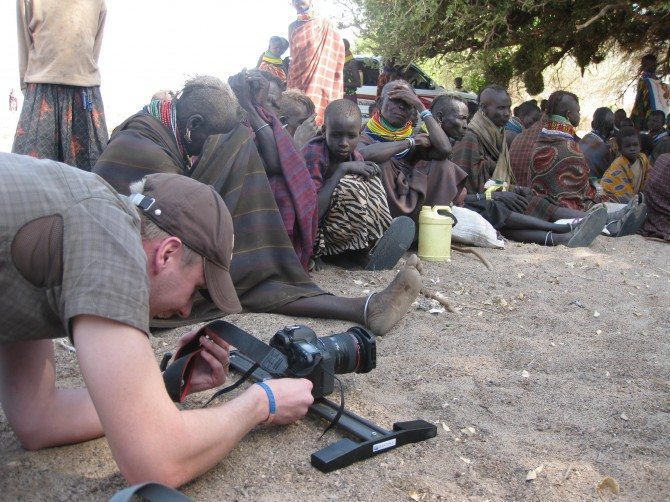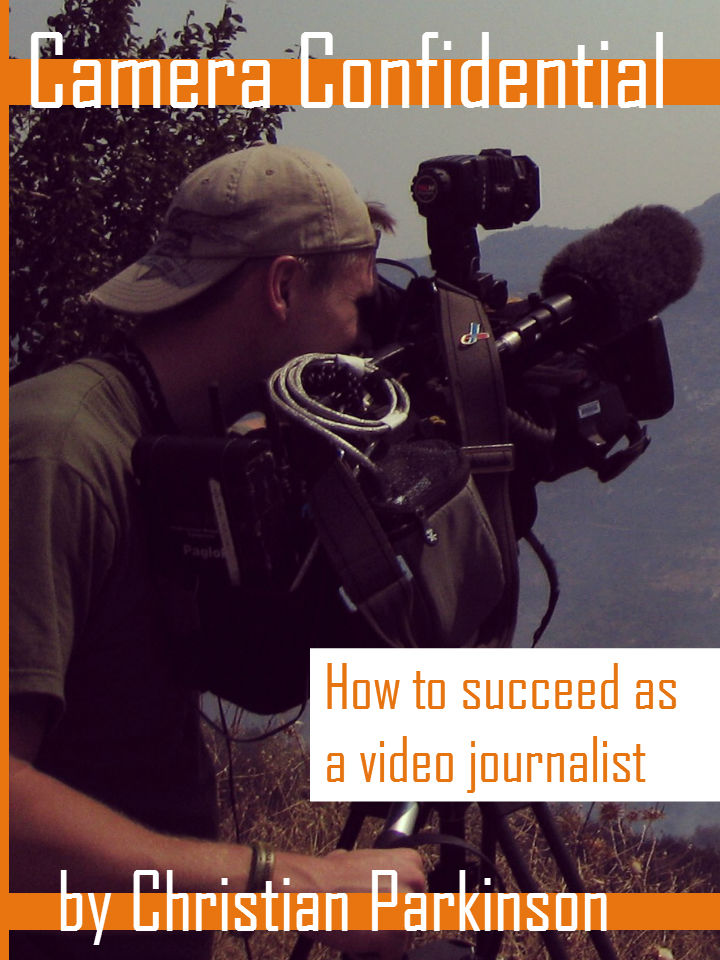
PHILIP: I have been a journalist for 25 years. 17 of those were working as a news cameraman in some bloody awful places but covering some incredibly important stories.
Just how important people like Christian (who has written the guest blog post below) are must not be underestimated. Without people like him and the countless others working in TV news, risking their lives to make sure what needs to be told is told, we would live in the dark ages, and some of the most desperate plights of man, the injustices, would never be highlighted and we would remain ignorant.
Yes, some TV news programmes are biased and their journalism can, at times, be questionable, but I am a firm believer that these are in the minority. UK TV news for example is forbidden to be politically biased, unlike UK newspapers, although in reality it’s not as easy as that. Anyway, this is for a different post.
For me, my 17 years in TV news were the most important years of my professional life. I learnt so much and would not be doing what I am today were it not for my time at Sky News. It’s rare to see people ask me about wanting to work in TV news. Everyone wants to make movies. Well I can tell you that working in this profession is one of the most rewarding careers you can have. It can be creative, exhilarating, terrifying, rewarding, soul destroying and life affirming to name just a few. Most importantly, you can be doing something that truly matters. That to me is important in life. I had to leave for many reasons. One of the key ones was it was changing me too much into someone who was becoming too bitter and too cynical. I needed to find a way to change this.
This is a brief guest blog post, essentially an introduction to Christian’s excellent book. All proceeds of the sale go to the Rory Peck trust, a wonderful thing to do, Christian. The Rory Peck Trust is the only organisation dedicated to the support, safety and welfare of freelance news-gatherers around the world. Best of luck with the e-book and for the excellent work you are doing out there Christian. Stay safe!
GUEST POST BY CHRISTIAN PARKINSON
@imagejunkies
It doesn’t matter what you call yourself: cameraman, shoot/edit, video journalist, multimedia journalist, backpack journalist, SoJo, photog, shooter, photojournalist, video Producer, visual journalist…we are image makers who love to tell stories. We document the world around us, capture moments and try to explain them and why they are important. It‟s not just a job, it‟s a calling.
I’m Christian Parkinson a full time shooter/editor and VJ for the BBC and blogger at http://www.imagejunkies.com. I’ve been shooting and editing national and international news for twelve years, firstly with ITN and then with the British Broadcasting Corporation. I spent four years with the BBC’s Africa Bureau where my work in the Democratic Republic of Congo won the prestigious David Bloom Award presented by President Obama. It was later shortlisted for an International Emmy.
I’ve always been a fan of books and blogs that look behind the scenes of our job and give a taste of the skills and logistics required. My favourite Phil Bloom post is his excellent article on traveling with gear http://philipbloom.net2012/02/13/flying-with-gear/. Therefore I have recently finished writing a book that examines and explains the practical and personal skills needed to push your career forward. Camera Confidential is not about the technical side of video journalism. It‟s not going to explain white balancing, the difference between CCD‟s and CMOS sensors, and it won’t discuss camera specs (I’ll leave that to guys like Phil who know what they are talking about!). No, this book is the book I wish somebody had given to me when I started shooting many years ago. It will answer questions such as: How do I find my first job? What paperwork do I need to complete when travelling with kit? What gear should I carry in a war zone? How should I protect my camera when shooting in the desert/snow/jungle? How do I shoot an anonymous interview?

Working as a cameraman or video journalist in news and documentaries is one of the toughest but also one of the most satisfying jobs in the world. The years you spend shooting news and telling stories will stand you in excellent stead for any other challenge within the industry. As Philip Bloom told me: “I learnt from some amazing cameramen at Sky news. I knew nothing when I started. News cameramen work fast, think fast and react fast. I would always prefer to work with someone from a news background. You can always spot them. I would love to see the cameramen who look down on news shooters try it for a week! To create quality images under immense pressure is testament to the quality of people out there.”
Phil is one of many contributors to the book and his input sits alongside other giants of the industry like Darren “DC” Conway and Fred Scott who are multiple award winners for their outstanding news and documentary filming. It’s the interviews with guys like them that I think make this book special.

I’ve tried to keep Camera confidential short and concise and I’ve included handy lists like the one below that covers working in extreme desert conditions.
➢ The black colour of your camera will soak up the heat so keep it covered or in the shade whenever possible and don‟t leave the viewfinder tilted up toward the sun. Also if you are expecting sandstorms or helicopters to be taking off and landing nearby then have a cover for the camera ready – in Afghanistan I often keep a bin bag handy to throw over the camera to protect it from the immense dust cloud thrown up by choppers. Your cameras rain jacket can also be used.
➢ ▪Keep your kit clean. Carry a paintbrush to dust the camera down regularly. Be wary of compressed air as it can push the sand grains deeper into the system. Use a UV filter to protect the lens and keep it spotless otherwise you‟ll get shots ruined by dust.
➢ ▪Don‟t change disks or tapes in the open air, if you have to then do it as quickly as possible. Try and change them inside your vehicle or tent and then store them somewhere cool and in a waterproof/airtight case – Tupperware boxes can be useful for this.
➢ ▪Consider bringing some pelican cases and a pop up tent to store your gear in if staying outdoors overnight.
➢ ▪Take a backpack with a bladder (like a camelback) so that you always have easy access to liquid. Make sure you and your colleagues remind each other regularly to hydrate – you‟d be surprised how easy it is to forget.
➢ ▪Experienced South African cameraman Glenn Middleton has filmed extensively in the deserts of Africa and the Middle East. He has this advice: “Filming in the desert is a big challenge; I wish they made a condom for cameras. The dust gets everywhere, but now that cameras don’t shoot with tape anymore it is a bit less risky. Don’t make the mistake of trying to clean your camera with a blast of air, all you doing is blowing the dust further into your gear. Use a paint brush instead. The best plan is to keep the camera free from dust and at the end of your shoot take gear in for a service. I found that a few plastic bags help if you wrap it around the camera. It doesn’t make for easy filming but it‟s better than nothing.”
Oh, and did I mention that all proceeds from the book are going to charity? I decided that I wanted this book to help others within our industry and therefore I have released it in conjunction with the Rory Peck trust who receive one hundred percent of the money made from sales. If you don’t know them the RPT provide practical assistance and support to freelance news-gatherers and their families worldwide, to raise their profile, promote their welfare and safety, and to support their right to report freely and without fear. Due to my own years working in Africa and seeing the huge risks that local freelancers take I’ve asked for any money made to help give safety training to shooters from the continent.
If you want to purchase a copy of the book then please feel free to follow the link below and click on the tab that says “get your copy of camera confidential”. Enjoy!
https://rorypecktrust.org/rpt-live/July-2014/writing-camera-confidential


